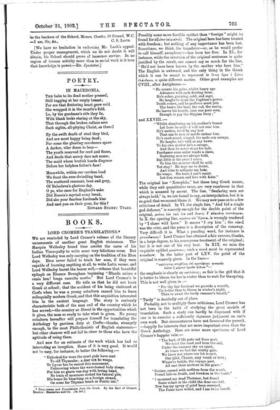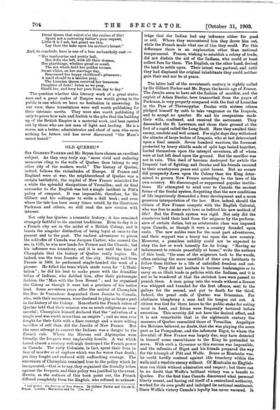BOOKS.
LORD CROMER'S TRANSLATIONS.* WE are reminded by Lord Cromer's volume of the literary 'amusements of another great English statesman. The Marquis Wellesley found time amidst the cares of his Indian Viceroyalty to write some very felicitous verse. But Lord Wellesley was only carrying on the tradition of his Eton days. Eton never failed to teach her sons, if they were capable of learning anything at all, to write Latin verses, and Lord Wellesley learnt the lesson well,—witness that beautiful epitaph on Eleanor Brougham beginning "Blanda anima e minis hen ! longs exercita morbo." But Lord Cromer's is
a very different case. He tells us that he did not learn Greek at school ; that the accident of his being stationed at Corfu when he was a young subaltern caused him to learn colloquially modern Greek, and that this acquisition interested him in the ancient language. The story is curiously characteristic both of the man and of the country which be
has served,—the country so liberal in the opportunities which it gives, the man so ready to take what is given. No young
subaltern hereafter will prepare himself for translating the Anthology by garrison duty at Corfu—thanks, strangely enough, to the most Philhellenistic of English statesmen—
but other chances will not fail to come to those who have the aptitude of using them.
And now for an estimate of the work which has had so interesting an inception. Some of it is very good. It would not be easy, for instance, to better the following :— " Unlocked-for woes the cruel gods have sent To old Thymocles ; a dear son he weeps. To Lycus has he reared this monument, Unknowing where the wave-tossed body sleeps. For him no grave. wasdug with loving hand, No train of mourners decked his funeral pile, His bones lie bleaching on .a foreign strand, On some far Thynian beach or Politic isle."
.• Paraphrases and Translations from the Gruk. By the Earl of Cromer. London Macmillan and Co. [5e. net.] Possibly some more forcible epithet than "foreign" might be found for if,ifeou (alytaX4). The original here has been treated with freedom ; but nothing of any importance has been lost.
Sometimes, we think, the translator—or, as he would prefer to call himself, paraphraser—has been too free. In XI., for instance, while the inversion of the original sentences is quite justified by the result, one cannot say as much for the line, " He'd not have been known by the mother who bore him."
The English ie awkward, and the only thing in the Greek which it can be meant to represent is [Aso, :way o teiroc 7tri.:,Boimer, a quite different matter. Other good examples are CVIIL, after Antiphanes :- " He counts his gains, whilst hoary age Advances with each fleeting hour, He's sober, grasping, cold, and sage, He laughs to scorn the Paphian's power.
Death comes, and he perforce must join The brave, the base, the sad, the merry.
He leaves his hoards, save one poor coin, Enough to pay the Stygian ferry ;" and XXVM. :— " Whilst slumbering on his mother's breast Let Love be sold—I will not rear him.
He's useless, tried by any test That can to men or maids endear him.
He's snub-nosed. winged, his nails can ravage, He laughs, he's wild as any hawk.
To his own mother he's a savage,
And then he never stops his talk.
Perchance some sailor wants a slave, Seafaring men are always bold, But little is the price I crave, To him the monster shall be sold.
Yet stay ! He begs me to desist, And tries to mitigate my hate.
He weeps. His tears I can't resist, Let him remain and live with Kate."
The original has "Xenophile," but these long Greek names, while they suit quantitative verse, are very cumbrous in that which is scanned by accent. The line, " Seafaring men are always bold," is, we are bound to say, an interpolation, but it is so good that we cannot blame it. We may now pass on to a few criticisms of detail. In VI. the single line, "And bid a single god defiance," is scarcely enough for the double point of the original, thoamo; ervr rpOc gym and bard; a' agouti:9 avariacipat.
In X. the opening line, XnpYCOCJ TGY 'Epora, is wrongly rendered by " I chase wild Love." It means " I cry him "; the migue was the crier, and the poem is a description of the runaway.
Very difficult it is. What a puzzling word, for instance is vitexautzpvg! Lord Cromer has attained a fair success, thanks, in a levee degree, to his courageous treatment of the original; but it is not one of his very best. In XIX. we miss the exquisite epithet 1.4vpc'eryoo;; such a word must be represented somehow. In the latter part of LXV. the point of the original is scarcely given. In the lines- " KfaXiffInt O'TEO9CVC.1 mpaniooseri oprawas AtSiov idp.vesv hpivav *glut's, "- the emphasis is clearly on xahh tern; ; so fair is the girl that it is better to bloom for her in winter than to wait for the spring. This is not well given in :— " For thy fair forehead we provide a wreath, 'Tis better thus to bloom in winter's night, Than to await the tardy summer's breath."
" Tardy " is decidedly out of place.
Probably, not to multiply these criticisms, Lord Cromer has not been in the habit of studying the great models of translation. Such a study can hardly be dispensed with if one is to exercise a sufficiently rigorous judgment on one's
own work. But circumstances have not favoured the pursuit, —happily for interests that are more important even than the Greek Anthology. Here are some more specimens of Lord Cromer's happier vein :— " The bark of life puts out from port,
We hoist the mast and trim the sail, Under the summer sky we sport, At times we feel the wintry gale. We know not where our lot is cast,
Our pilot, Chance, may wreck or !Aro ;
Whate'er betide, the voyage past,
All cast their anchors in the grave."
" Zosime, cursed with serfdom from the womb, Found Life in Death, and freedom in the tomb."
" I mourned my dead Theionod, but found Some solace in the child the dear one left. Now has my agony of grief been crowned,
The Fates have willed, and I am twice bereft. Dread Queen that rulest o'er the realms of Die! Spurn not a sorrowing father's poor request, Little it is I ask, but grant me this, Lay thou the babe upon his mother's breast."
And, to conclude, here is one of a less melancholy cast :-
" Her tambourine and pretty ball, Her dolls she left, with all their dresses, Her playthings, whether great or small, The net which held her golden tresses.
Sweet Chloe, on her marriage day, Renounced her happy childhood's pleasures ; A maid should to a maiden pray, The Limnian Queen received her treasures.
Daughter of Leto ! listen as we pray, Shield her, and keep her pure from day to day."
The question whether this literary work of a great states- man and a great maker of Empire was worth giving to the public is one which we have no hesitation in answering. In our view, these translations were well worth publishing for their intrinsic merits. They were also worth publishing if only to prove how vain and foolish is the gibe that the building up of the British Empire is a material work, and best carried out by those who are not men of light and leading. He is a worse, not a better, administrator and chief of men who cares nothing for letters and has never discovered " the Muse's secret hoard."



















































 Previous page
Previous page